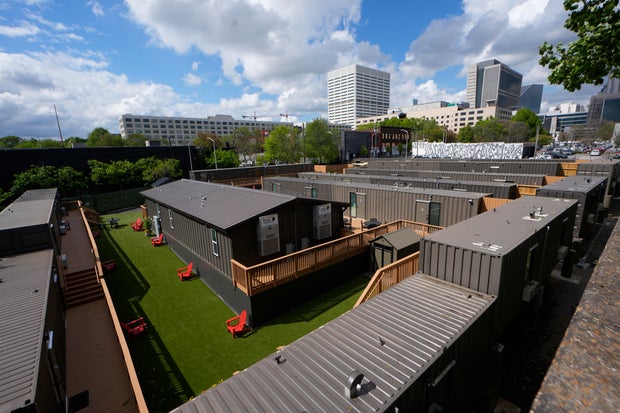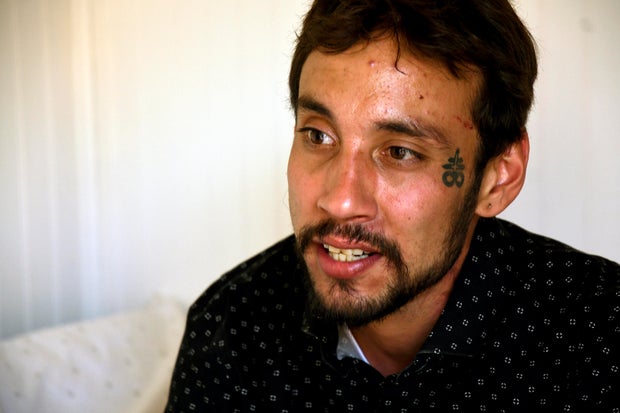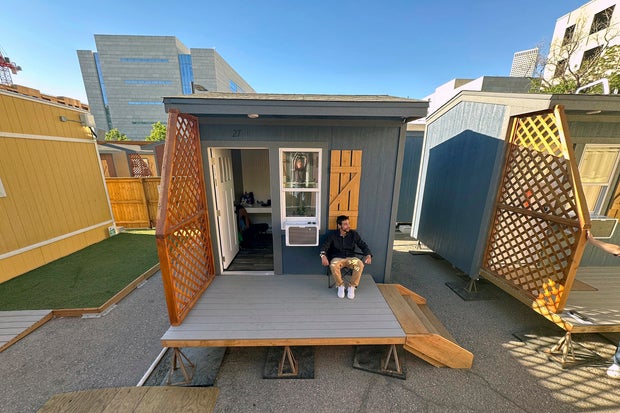In a dark part of downtown Atlanta, the shipping containers have been transformed into an oasis for dozens of formerly homeless people who now proudly call a former parking lot home.
The gated micro-community known as “The Melody” no longer looks like a parking lot. Artificial grass is spread across the asphalt. Potted plants and red Adirondack chairs abound. There’s even a dog park.
The containers have been divided into 40 isolated studios that include a single bed, HVAC unit, desk, microwave, small refrigerator, TV, sink and bathroom. On a recent afternoon, a half-dozen residents chatted around a table in The Melody’s smoking area.
John Bazemore/AP
“I’m so grateful,” said Cynthia Diamond, a 61-year-old former cook who uses a wheelchair and was chronically homeless. “I have my own key. I don’t have to worry about anyone knocking on my door, telling me when to eat, sleep, or do anything. I’m going to stay here as long as the Lord allows me to stay here.”
In the face of years of rising homelessness rates and failed solutions, city officials across the U.S. have embraced rapid housing options, emphasizing three factors: small, fast and cheap. Officials believe that microcommunities, unlike shelters, offer stability that, when combined with wraparound services, can more effectively put residents on the path to safe housing.
Sprouting across the nation
Denver has opened three micro-communities and converted another five hotels for homeless people. In Austin, Texas, there are three “tiny house” villages. In Los Angeles, a 232-unit complex has two three-story buildings stacked with shipping containers.
“Housing is a ladder. You start on the first step. People who are literally sleeping on the floor aren’t even on the first step,” said Denver Mayor Mike Johnston, sitting in one of the city’s new micro-communities that offer small, transition houses for that first step.
More than 1,500 people have been moved indoors through the program, with more than 80% still in housing as of last month, according to city data. Cheap units are particularly beneficial for cities with high housing costs, where moving so many people directly into apartments would not be financially viable.
Both the Atlanta and Denver programs act as a stepping stone as they work to get people jobs and more permanent housing, with Denver aiming to move people within six months.
That includes Eric Martinez, 28, who has been in limbo between the street and the bottom step for most of his life. At birth, Martinez was thrown into the revolving door of foster care and struggled with substance use while couch surfing and pitching tents.
Thomas Peipert/AP
“It’s kind of humiliating, it makes me feel like less of a person,” Martinez said, with his eyes downcast. “I had to snap out of it and take care of myself in that moment: it’s fight or flight, and I flew.”
Martinez’s encampment in Denver was swept and he and the others were directed to microcommunities of small cabin-like structures with single beds, desks and closets. The city built three of these communities with nearly 160 units total in about six months, at about $25,000 per unit, Johnston said. The 1,000 converted hotel units cost about $100,000 each.
At the microcommunity site there are restrooms, showers, washing machines, small dog parks, and kitchens, although the Salvation Army delivers meals.
The program represents a turnaround from policies that for years focused on short-term group shelters and the incessant moving of encampments from block to block. This system made it difficult for people scattered throughout the city to connect with services and on their way to permanent housing.
Thomas Peipert/AP
These services in the micro-communities of Denver and Atlanta are largely centralized. They offer residents case management, counseling, mental health and substance abuse therapy, housing counseling, and assistance in obtaining everything from vocational skills training to a new pair of dentures.
“We are able to address all levels of the hierarchy of needs – from safety and shelter, to self-fulfillment and a sense of community,” said Peter Cumiskey, clinician at the Atlanta site.
Melody, and projects like it, are a “very promising, viable and cost-effective way” to combat homelessness, said Michael Rich, a political science professor at Emory University who studies housing policy. Rich noted that transitional housing is still just the first step toward permanent housing.
The programs in Denver and Atlanta, modeled after similar programs in cities such as Columbia, South Carolina, and Savannah, Georgia, offer a degree of privacy and security not found in congregate shelters or camps.
Giving each resident their own bathroom and kitchen is a crucial feature that helps set The Melody apart, said Cathryn Vassell, whose nonprofit Partners For Home oversees the micro-community. In addition to the ban on overnight stays, officials emphasize that tenants are treated as independent residents.
Vassell acknowledged it’s unclear how long the containers will last — she expects 20 years. But, she said, they were the right choice for The Melody because they were relatively inexpensive and already had handicap-accessible bathrooms, since many were used by Georgia hospitals during the COVID-19 pandemic.
The project, which took just four months to complete, cost about $125,000 per unit — not “extremely cheap,” Vassell said, but less than traditional construction and much faster. Personnel and security operations cost about $900,000 per year.
City officials look to expand rapid housing
The Melody is the first part of Atlanta Mayor Andre Dickens’ goal to provide 500 units of rapid housing on city-owned land by December 2025. A 2023 “point in time” count found there were 738 homeless people in Atlanta, much less than many cities, but still an increase from the previous year.
“We need more tunes ASAP,” said Courtney English, the mayor’s policy director.
Few objected when The Melody was announced last year, but as city officials look to expand housing quickly, they know local resistance is likely. That’s what Denver faced.
Mayor Johnston said he attended at least 60 town halls in six months as Denver tried to identify sites for new communities and faced resistance from local residents concerned about trash and safety.
“What concerns them is the current experience of homelessness,” Johnston said. “We had to get them to see not the world as it used to exist, but the world as it could exist, and now we have the evidence of what that could be.”
Prepared for a change at any time
The scars of street life still remain on Martinez. All of his belongings are prepared to be moved at any time, although he feels safe in his small home next to his cat, Appa.
The community has been “very uplifting and supportive,” he said, pausing. “You don’t understand much.”
On his wall is a calendar with work guidelines written in pencil. The next step is to work with the team to get a housing voucher for an apartment.
“I’m always looking down on myself for some reason,” he said. But “I feel like I’ve done a really good job. Everyone is really proud of me.”
g esportes
globo logo
g1 da globo
notícias da globo
ge.com globo
uol o melhor do conteúdo

























